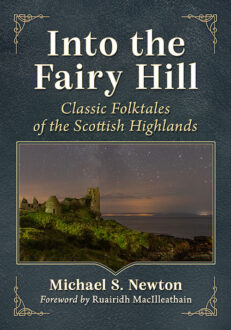Into the Fairy Hill
Classic Folktales of the Scottish Highlands
$39.95
In stock
About the Book
Headstrong heroines and hot-tempered chieftains, loch monsters and hill fairies, cattle raids and clan feuds, wise animals and foolish saints: the Scottish Highlands’ folktales date back centuries and preserve the history and beliefs of a people deeply rooted in their land and culture. Oral traditions connect the modern world with the hearts and minds of Scottish Highlanders across the ages, bringing their world to life in vivid detail.
This anthology includes new and approachable translations of folktales from the Scottish Highlands and Nova Scotia, providing extensive commentary on this rich storytelling tradition. Each story is annotated with information about its origins and any insights into its meaning. The original Scottish Gaelic texts, collected from a wide variety of rare and obscure sources, are provided in an appendix.
About the Author(s)
Bibliographic Details
Michael S. Newton
Foreword by Ruairidh MacIlleathain
Format: softcover (7 x 10)
Pages: 276
Bibliographic Info: 7 photos, appendix, notes, bibliography, index
Copyright Date: 2022
pISBN: 978-1-4766-9002-5
eISBN: 978-1-4766-4767-8
Imprint: McFarland
Table of Contents
Acknowledgments ix
Ro-ràdh / Foreword by Ruairidh MacIlleathain / Roddy Maclean 1
Introduction: The Power of Stories 7
Scottish Highlands: People and Place 9 • How Highlanders Experienced Folktales 13 • Gaelic Folktale Scholarship in Scotland 18 • How Folktales Work 23 • About the Texts in This Volume 25
Chapter One. Tales of Wonder 29
The Frog Prince 31 • Silver-Tree and Gold-Tree 32 • The Grazing of Cruachan 35 • The Language of Birds 40 • Great Seanchan and the Smith of the Tales 46 • The Tale of Mànus 49
Chapter Two. Tales About Life and the World 56
How Scotland Was Formed 57 • The Eagle of Loch Tréig 58 • Escaping Doomsday 60 • The Origin of the Milky Way 63 • The Origin of the Will o’ Wisp 64 • How the Wren Became the King of Birds 65 • Why the Dog-Fish Is Called “the King’s Fish” 66 • The Hawk Teaches the Fox a Lesson 67 • Oh, Adam! 67 • The Clan of the Sixty Blockheads 69
Chapter Three. Tales of Culture Heroes and Ancients 71
The Boyhood Deeds of Cù Chulainn 72 • How Cù Chulainn Killed His Only Son 74 • The Origin Story of Fionn and the Fianna 75 • How Fionn Got His Psychic Powers 79 • Garaidh and the Women 80 • Fionn in the House of Yellow Face 82 • Diarmaid and Gràinne 86 • The Hunt for the Venomous Boar in Ross 88
Chapter Four. Historical Legends and Clan Sagas 90
Columba and Mo Luag in Lismore 92 • Columba and His Brother Dòbhran at Iona 93 • Saints of Kintail 95 • The Norse Princess’s Mock Lament 96 • The Sea-People of Arran 98 • The Feral MacDonalds of Braemar 100 • The Big Blacksmith of Glen Urquhart 101 • The Camerons’ Doomed Raid on the Lennox 103 • The Outlaw Black-Haired Finlay MacRae 106 • Donald of the Songs and the Deer 108 • The Battle of Tràigh Ghruinneart 110 • The Glen Quaich Bridge 117 • The Battle of Carinish 118 • The MacGregors and the Campbell Bloodhounds 121 • The Battle of Sròn a’ Chlachain 122 • The Loch Earn Robber 123 • The Massacre of Glencoe 124
Chapter Five. Tales of the Otherworldly 128
The Origin of the Fairies 130 • Dispirited Fairies in Ross-shire 131 • The Stuff of Life 132 • The Fairies and the Farmer’s Gift 132 • Great MacMhuirich and the Fairies 133 • The Glaistig of Glen Duror 134 • The Gruagach Stones 135 • The Red Hand of Kincardine 136 • The Specter of the Tay and the Fairy-Fort of Kincraigie 137 • The Tailor of Rannoch and the Fairy 137 • The Fairies and the Stolen Wife 139 • The Chanter from the Fairies of Loch Roag 140 • MacCrimmon’s Fairy Sweetheart 140 • The Uruisg’s Reward 141 • The Cloven-Hoofed Sweetheart 143 • The Last Each-Uisge in Lewis 144 • MacPhee’s Black Hound 145 • The Old Wife of Laggan 148 • The Witch of Braemar 150 • MacLeod of Dunvegan and the Witches 151 • Hugh of the Wee Head 152 • The Washing Woman and the Chieftain of Clanranald 154 • The Midwife and the Queen of the Fairies 155 • The MacGlashens of Lismore 156 • The Farr Seer 157 • The Dream of the Dead in Strath Tummel 157
Epilogue: Reclaiming Our Voices 159
Appendix: Original Gaelic Sources 163
A’ Bhànrigh a Dh’Iarr Deoch á Tobar Àraid 163 • Craobh-Airgid agus Craobh-Òir 164 • Buachailleachd Chruachain 166 • Cànan nan Eun 172 • Seanchan Mór an Éirinn is Gobha nan Sgeul an Albainn 177 • Eachdraidh Mhànuis 179 • A’ Chailleach Bheur 185 • Iolaire Loch Tréig 185 • Teicheadh ro’n Bhràth 187 • Sgrìob Chloinn Uisnigh 189 • An Teine Mór 190 • Rìgh nan Eun 191 • An t-Adhbhar mun Abairear Iasg Rìgh ris an Dallaig 192 • O, Àdhaimh! 192 • Sliochd nan Trì Fichead Burraidh 194 • Tòrachd na Tàine 195 • Mar a Thòisich an Fhéinn 196 • Fionn agus am Bradan 199 • Garaidh agus na Mnathan 200 • Fionn an Taigh a’ Bhlàir Bhuidhe 202 • Diarmaid agus Gràinne 205 • Diarmaid agus Bran 208 • Calum Cille agus Dòbhran a Bhràthair 208 • Naoimh Chinn-Tàile 210 • An Caoineadh-Magaidh 211 • Innis Eabhrach 213 • An Gobhainn Mór 214 • Calum Garbh mac Eòghainn 216 • Fionnlagh Dubh MacRath 218 • Dòmhnall mac Fhionnlaigh nan Dàn 220 • Blàr Tràigh Ghruinneart 222 • Drochaid Lag nan Cladhairean 228 • Blàr Chàirinnis 229 • Clann Ghriogair agus Coin Dubha nan Caimbeulach 232 • Latha Blàr Shròn a’ Chlachain 232 • Creachadair Loch Éire 233 • Murt Ghlinn Comhann 235 • Na Sìdhichean ann an Siorramachd Rois 237 • Na Sìdhichean ann an Raithneach 237 • An Tuathanach agus na Sìbhrich 238 • Glaistig Ghlinn Dùror 239 • Tàillear Ruadh Raithneach 240 • A’ Bhean a Ghoid na Sìdhichean 241 • Siùnnsair MhicCruimein 242 • Iain Dubh Mór agus an Uruisg 242 • An Leannan Crodhanach 244 • Cù Dubh Mhic a’ Phì 244 • Cailleach an Lagain 247 • MacLeòid Dhùn Bheagain is na Bana-Bhuidsichean 249 • Eóghann a’ Chinn Bhig 249 • Mac ’ic Ailein agus Luideag an Uillt 251 • A’ Bhean-Ghlùine agus Bànrigh nan Sìbhreach 252 • Clann MhicGlaisein ann an Lios Mór 253 • Am Fiosaiche ann am Fàrr 254 • Bruadar nam Marbh ann an Srath Theimheil 254
Chapter Notes 257
Bibliography 261
Index 265
Book Reviews & Awards
• “This collection of folktales pays tribute to the oral traditions of the Scottish Gaelic people who lived in the highlands of western Scotland and in Nova Scotia….Chapters with names like ‘Tales of the Otherworldly’ and ‘Tales of Wonder’ present over sixty tales, introduced by meticulous accounts of who recorded the story, when, and in what publication, along with general commentary on variations, formats, morals, and indications of how the tale might have been told, with sound effects or audience participation…. This comprehensive and authoritative resource will be of interest to academic collections.”—Booklist
• “Michael Newton is to be commended on his new collection of Scottish Gaelic folktales, which will be a valuable resource for the general and academic reader alike. He has done a great service to the Gaelic community, not only by re-editing a sizable stock of folklore material—emending the errors and outdated orthography of editions long out of print—but also by providing fresh, accessible English translations that will enable a wide audience to enjoy these delightful stories anew.”—Natasha Sumner, associate professor, Celtic languages and literatures, Harvard University
• “You hold in your hands a book that is both intellectually fascinating and emotionally spellbinding. As one of today’s preeminent scholars of Scottish Gaelic language and its wider culture, Michael Newton has succeeded in breathing back to life the dying embers of the ‘ceilidh house’ of bygone times, that humble yet far-reaching University of Life. In an era when knowledge can too often lack wisdom, where cognition can too readily lack imagination’s vision, this book calls back the soul’s long-ebbing tide. May these tales find new life in those who hear them shared aloud today. May they open out new depths of meaning in these troubled times. A blessing on the house and ‘Peace be here!’ where they find currency. And as the tradition had it, ‘So be it.’”—Alastair McIntosh, honorary senior research fellow, University of Glasgow
• “An impressive work of original scholarship…Unreservedly recommended”—Midwest Book Review






